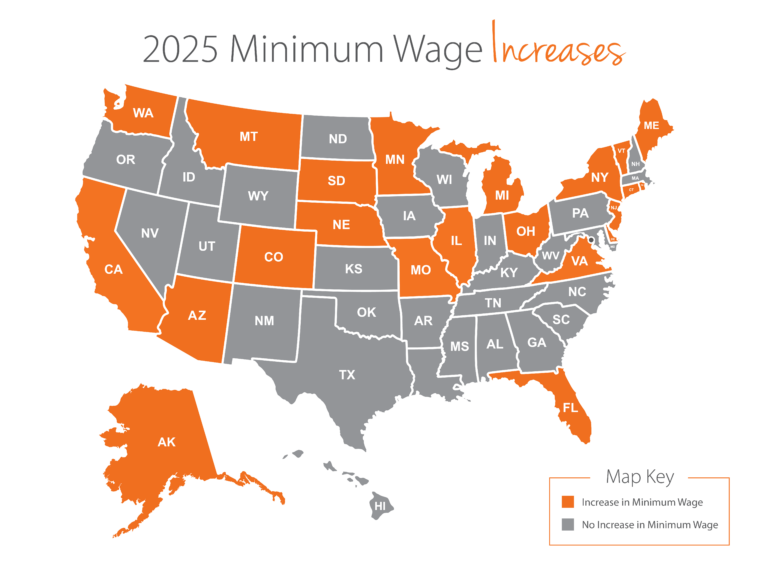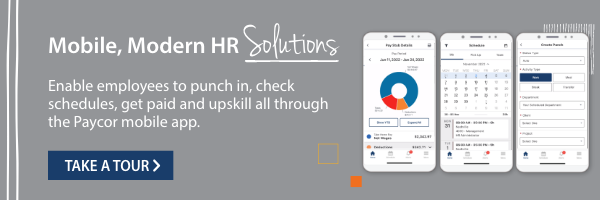Federal and state minimum wage changes in 2025
Minimum wage laws are complicated, and they’re constantly changing. If your company has employees in multiple states, keeping up with these updates can be daunting. While some states are on a schedule for annual increases to eventually reach $15 an hour, others still adhere to the federal minimum. Although the current federal minimum wage of $7.25 has not budged since 2009, more than 20 states have provided additional increases in 2025.
To help your business follow the latest minimum wage requirements for full-time and part-time workers, Paycor has created a breakdown. See below for a list of minimum wages by state.
2025 State Minimum Wage Rates
| State | 2025 Minimum Wage (effective 1/1/24 except as noted) |
| Alabama*** | $7.25 |
| Alaska | $13.00 (effective July 1, 2025) |
| Arizona | $14.70 |
| Arkansas* | $11.00 |
| California** | $16.50 (Wage by city in California) |
| Colorado** | $14.81 |
| Connecticut | $16.35 |
| Delaware | $15.00 |
| Florida | $14.00 (effective September 30, 2025) |
| Georgia† | $7.25 |
| Hawaii * | $14.00 |
| Idaho* | $7.25 |
| Illinois | $14.00 |
| Indiana* | $7.25 |
| Iowa* | $7.25 |
| Kansas* | $7.25 |
| Kentucky* | $7.25 |
| Louisiana*** | $7.25 |
| Maine | $14.65 |
| Maryland** | $15.00 |
| Massachusetts* | $15.00 |
| Michigan | $10.56 |
| Minnesota | $11.13 |
| Mississippi*** | $7.25 |
| Missouri | $13.75 |
| Montana | $10.55 |
| Nebraska | $13.50 |
| Nevada | $12.00 |
| New Hampshire* | $7.25 |
| New Jersey | $15.49 for businesses with 6 or more employees $14.53 – businesses with fewer than 6 and seasonal employees |
| New Mexico | $12.00 |
| New York** | $15.50 |
| North Carolina* | $7.25 |
| North Dakota* | $7.25 |
| Ohio | $10.70 |
| Oklahoma* | $7.25 |
| Oregon** | $15.95 (Portland metro); $14.70 (standard); $13.70 (non-urban) through June 30, 2025 |
| Pennsylvania* | $7.25 |
| Rhode Island | $15.00 |
| South Carolina*** | $7.25 |
| South Dakota | $11.50 |
| Tennessee*** | $7.25 |
| Texas* | $7.25 |
| Utah* | $7.25 |
| Vermont | $14.01 |
| Virginia* | $12.41 |
| Washington | $16.66 |
| Washington D.C.* | $17.50 |
| West Virginia* | $8.75 |
| Wisconsin* | $7.25 |
| Wyoming† | $7.25 |
* No change from 2024 has been announced.
** Varies by geographical location within the state.
*** State does not have local minimum wage regulations, and instead adheres to federal minimum wage laws.
† State minimum wage is lower than the federal minimum wage. Most – but not all – employees are paid according to federal regulations.
Comparison of Minimum Wages
As states continue to raise their minimum wage rates, there is growing variation across the country. In 2025, minimum wages are expected to range from as low as $7.25 per hour up to $16.66 per hour.
The states with the highest minimum wages slated for 2025 are:
- Washington: $16.66
- California: $16.50
Outpacing all the states, though, is Washington, D.C., with a minimum wage of $17.50 for 2025.
Georgia and Wyoming actually have state minimum wages lower than the federal rate, though the federal rate applies in most cases. Other states that match the federal rate of $7.25 include Alabama, Idaho, Indiana, Iowa, Kansas, Kentucky, Louisiana, Mississippi, New Hampshire, North Carolina, North Dakota, Oklahoma, Pennsylvania, South Carolina, Tennessee, Texas, Utah, and Wisconsin.
Over the past decade, there’s been clear movement toward a higher minimum wage across the country. According to the Economic Policy Institute’s Minimum Wage Tracker, 28 states and D.C. have changed their minimum wage law since January 2014. 30 states and D.C. have adopted a minimum wage higher than the federal minimum wage. In addition, 63 localities have adopted minimum wages above their state minimum wage.
This steady increase reflects a growing recognition that the federal minimum wage of $7.25, set in 2009, is no longer sufficient to provide an adequate standard of living for many workers. The minimum wage is indexed for inflation in 19 states and D.C., meaning it automatically adjusts each year for increases in prices. As state legislatures respond to pressure from labor advocates and their constituents, we’re likely to continue seeing an upward trend in minimum wage rates.
Frequently Asked Questions
Get quick answers to your minimum wage questions.
Which States Are Increasing the Minimum Wage in 2025?

More than 20 states have announced minimum wage increases for 2025. These states are:
- Alaska
- Arizona
- California
- Colorado
- Connecticut
- Delaware
- Florida
- Illinois
- Maine
- Michigan
- Minnesota
- Missouri
- Montana
- Nebraska
- New Jersey
- New York
- Ohio
- Rhode Island
- South Dakota
- Vermont
- Virginia
- Washington
In most of these states, the minimum wage is scheduled to increase on January 1, 2025.
Is the Federal Minimum Wage Rising in 2025?
No. The federal minimum wage has remained $7.25 since 2009.
Which States Have an Upcoming Increase to $15 Minimum Wage?
The following states have passed legislation to reach a $15 minimum wage in 2025 and beyond.
- Delaware (2025)
- Illinois (2025)
- Maryland (2025)
- New York State (2025)
- Rhode Island (2025)
- Nebraska (2026)
- Florida (2026)
What Are the Compliance Requirements for Businesses Operating in Multiple States?
Businesses that operate in multiple states must comply with the minimum wage requirement across all the states they have locations in. This can create administrative challenges as they need to track and implement different minimum wage rates.
Are there any Exemptions or Special Rates for Certain Types of Workers?
Yes, some states have exemptions or special minimum wage rates for certain categories of workers, such as tipped employees and youth workers. The specific exemptions vary by state and can add complexity for employers.
How Paycor Helps
For more than 30 years, Paycor has been guiding our clients through big changes to federal, state, and local taxes, as well as compliance. In-product compliance updates and notifications of key changes help ensure you pay your workforce the right rates, reducing complication, especially for multi-state employers.
Paycor’s expertise goes far beyond minimum wage. From recruiting and onboarding to people management, compliance, and more, we provide technology and expertise to help business leaders solve problems and grow their businesses. How can we help yours? Take a guided tour of our most popular solutions to find out.
Paycor is not a legal, tax, benefit, accounting, or investment advisor. All communication from Paycor should be confirmed by your company’s legal, tax, benefit, accounting, or investment advisor before making any decisions.










